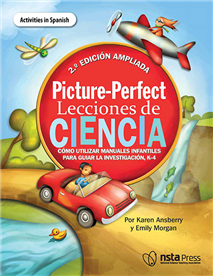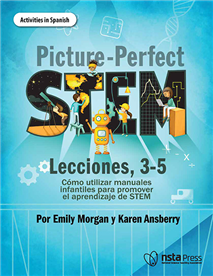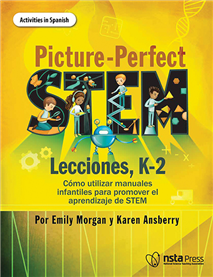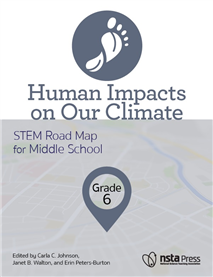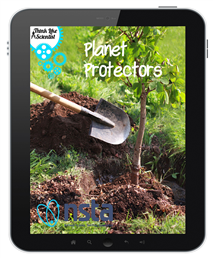All Resources
Journal Article
By STEPHEN MATTOX, JESSICA KETELAAR, AND ROBIN VANDERWEL
Journal Article
Is This Watershed Contaminated With PCBs?
By JACOB WHITE, JOHN A. MEANS, TIM HALL, AND DENISE SHOCKLEY
Journal Article
Global Environmental Issues and the Circular Bioeconomy
By ROBERT SMITH AND MARK RUDNICKI
NSTA Press Book
Healthy Living, Grade 10: STEM Road Map for High School
New in 2020! Download and read a sample chapter from this book to learn more.What if you could challenge your 10th graders to develop a product or process that helps people embrace diet and exercise and has a positive impact on society? With this vol...
Lesson Plan
Lesson Plan
Web Seminar
Dive into the data and information collected through the OpenSciEd field test. See how the wisdom from teachers and students informs the materials. ...
Lesson Plan
NSTA Press Book
A supplemental book of just the student activity pages in the Picture-Perfect Science series are available for each of the five Picture-Perfect teacher books. All of these activity pages are classroom-ready and written in Spanish. ...
By Karen Ansberry, Emily Morgan
eBook
A supplemental book of just the student activity pages in the Picture-Perfect Science series are available for each of the five Picture-Perfect teacher books. All of these activity pages are classroom-ready and written in Spanish. ...
Web Seminar
Archive: Teacher Tip Tuesday: Family Science at the Dinner Table, June 2, 2020
Does shelter-in-place have you running out of things to do with your children? Are you looking for new ideas to spark excitement around your dinner-table (or other family time) conversations? Learn more about how to engage children i...
Lesson Plan
Web Seminar
Archive: Science Update: NASA STEAM Innovation Lab-Explore, Create, Share!, August 27, 2020
This web seminar will highlight educational technology-based activities from NASA’s STEM Innovation Lab; a think tank and makerspace with an emphasis on earth and space science content applications. Ideas generated in the lab are captured,...
Web Seminar
As new information comes out from the Center for Disease Control (CDC) and researchers, educators, and parents are left with questions about the progression of the COVID-19, possible treatments and vaccines, and what the models tell us of what we can...
Lesson Plan
Lesson Plan
eBook
A supplemental book of just the student activity pages in the Picture-Perfect Science series are available for each of the five Picture-Perfect teacher books. All of these activity pages are classroom-ready and written in Spanish....
Lesson Plan
Lesson Plan
Lesson Plan
eBook
Human Impacts on Our Climate, Grade 6: STEM Road Map for Middle School (e-book )
What if you could challenge your sixth graders to come up with a way to help tackle climate change in their own community? With this volume in the STEM Road Map Curriculum Series, you can! Human Impacts on Our Climate outlines a journey that will ...
NSTA Press Book
Human Impacts on Our Climate, Grade 6: STEM Road Map for Middle School
New in 2020!What if you could challenge your sixth graders to come up with a way to help tackle climate change in their own community? With this volume in the STEM Road Map Curriculum Series, you can! Human Impacts on Our Climate outlines a journe...
Lesson Plan
Web Seminar
Learn about professional learning for teachers’ enacting OpenSciEd middle school science curriculum. Although curriculum materials are essential for three-dimensional learning, they need to be a part of a larger system of support. ...
Web Seminar
Explore how the OpenSciEd Instructional model and associated supports ensure that Emerging Multilingual students flourish using the investigative and problematizing routines embedded within the OpenSciEd Instructional Model. ...
Web Seminar
Explore how equitable instructional practices are central to the design of the OpenSciEd materials. Learn about the embedded features and practices and take away strategies and materials that will support equitable science learning in your own c...
Web Seminar
Explore how classroom routines embedded in the OpenSciEd units use student questions to drive the direction of students’ investigations and knowledge building. ...
Web Seminar
Science Update: The Technologies of Ocean Exploration - Today and Into the Future, July 16, 2020
Join us on Thursday, July 16, 2020, starting at 7:00 pm ET to learn about some of the amazing tools that are helping us to map, identify, characterize, and manage ocean resources now and for future generations....
NSTA Press Book
The NSTA Atlas of the Three Dimensions
Download and read a sample chapter from this book to learn more.A key aspect of learning in K–12 education is the idea that what students know and are able to do grows and evolves over time. Simple ideas learned in the early elementary grades gain...
By Ted Willard
eBook
The NSTA Atlas of the Three Dimensions (e-book)
A key aspect of learning in K–12 education is the idea that what students know and are able to do grows and evolves over time. Simple ideas learned in the early elementary grades gain levels of detail and complexity as students progress in their ed...
Lesson Plan
Interactive E-book Kids
In the Planet Protectors eBook, three friends notice that changes have occurred in their local park over the past five years. These friends want to figure out what has happened to the park and why these changes have occurred. In order to do this, the...
Lesson Plan



